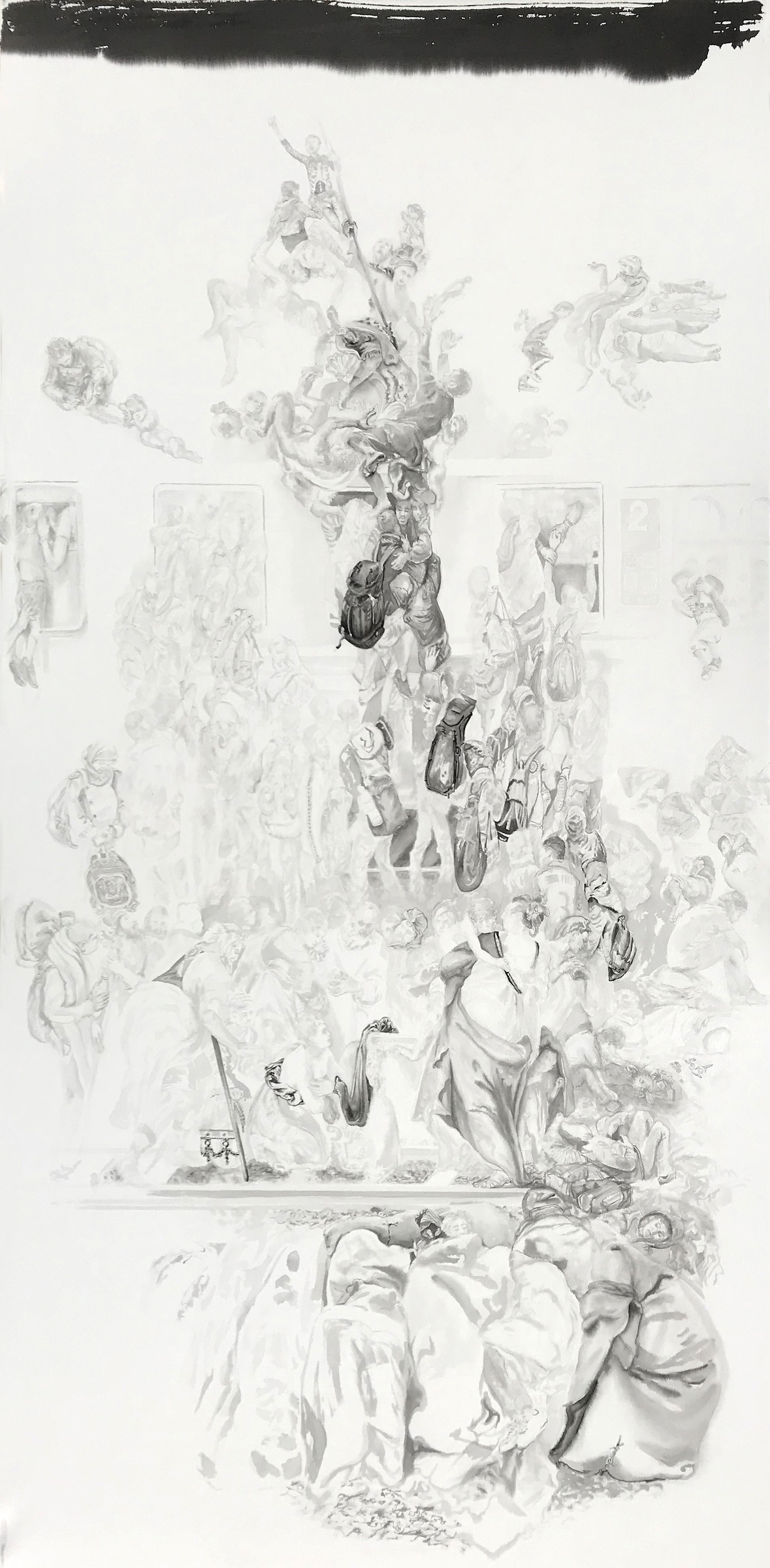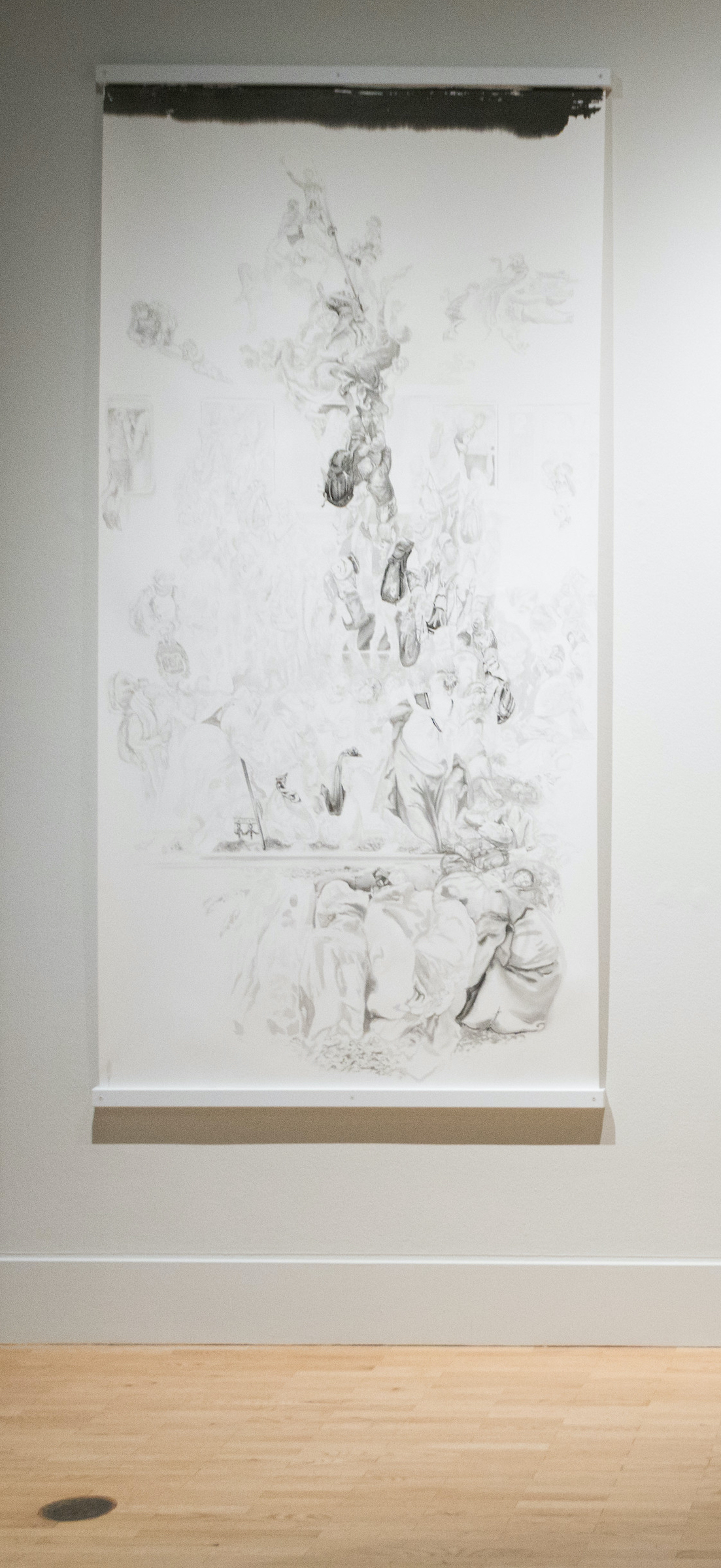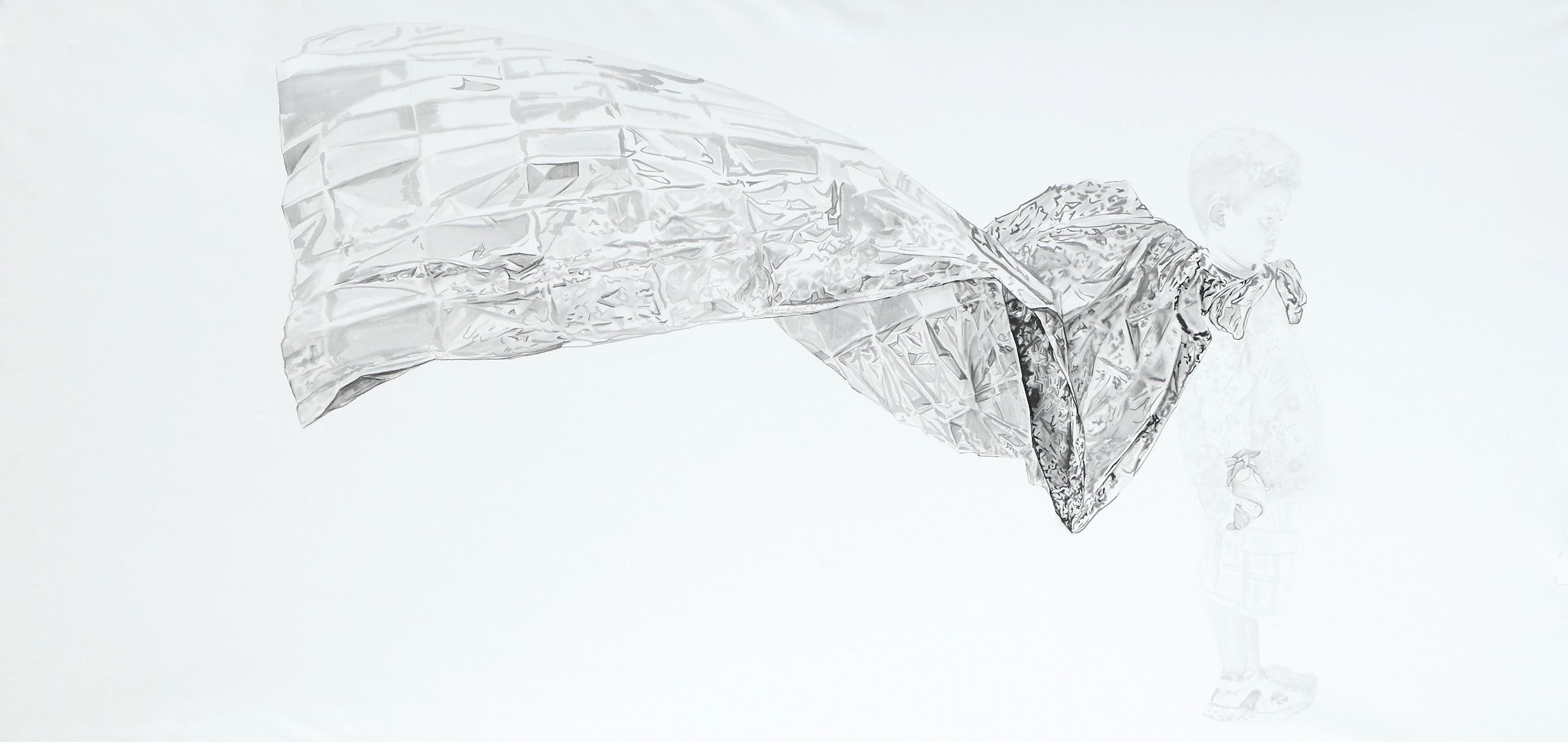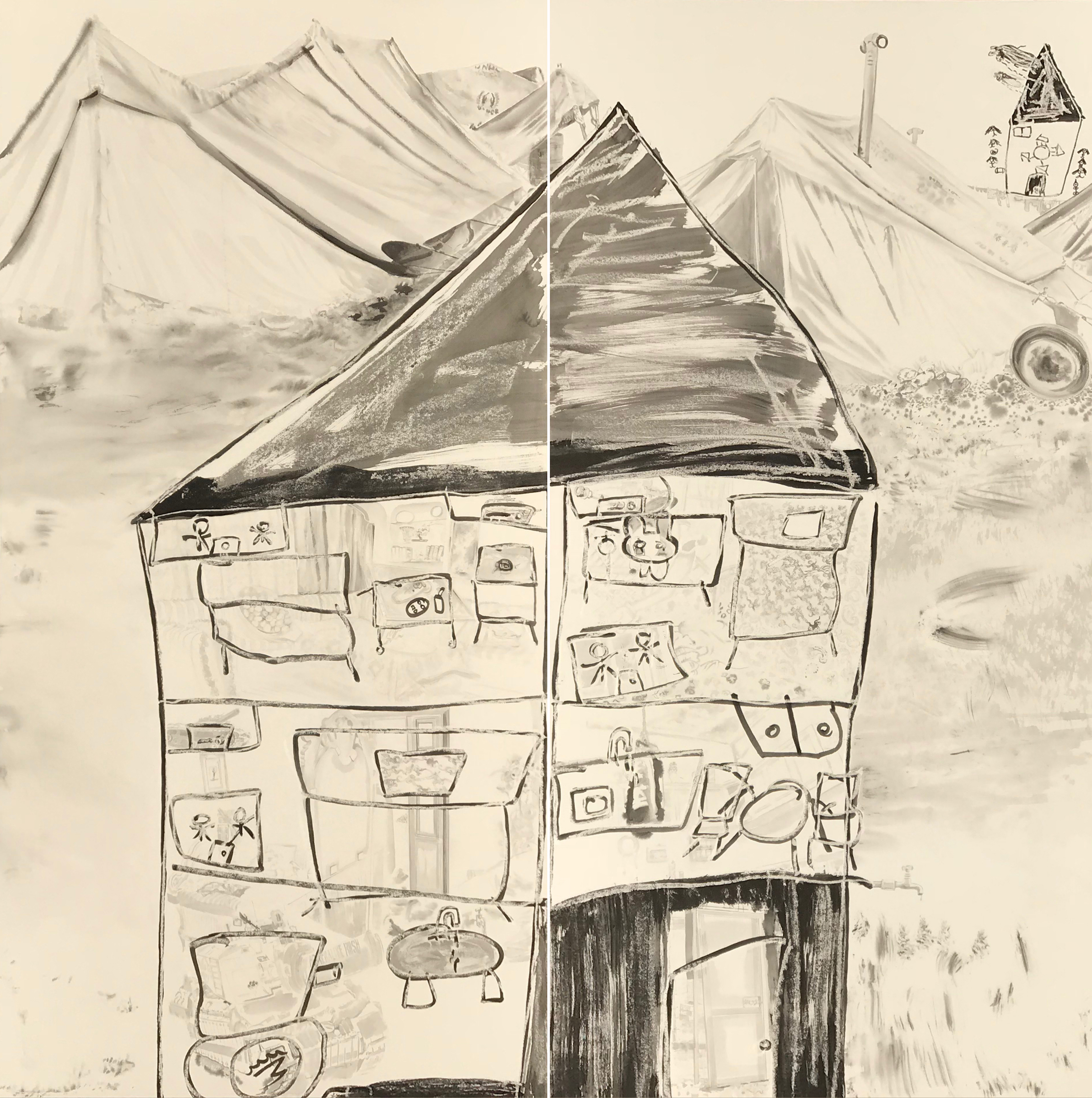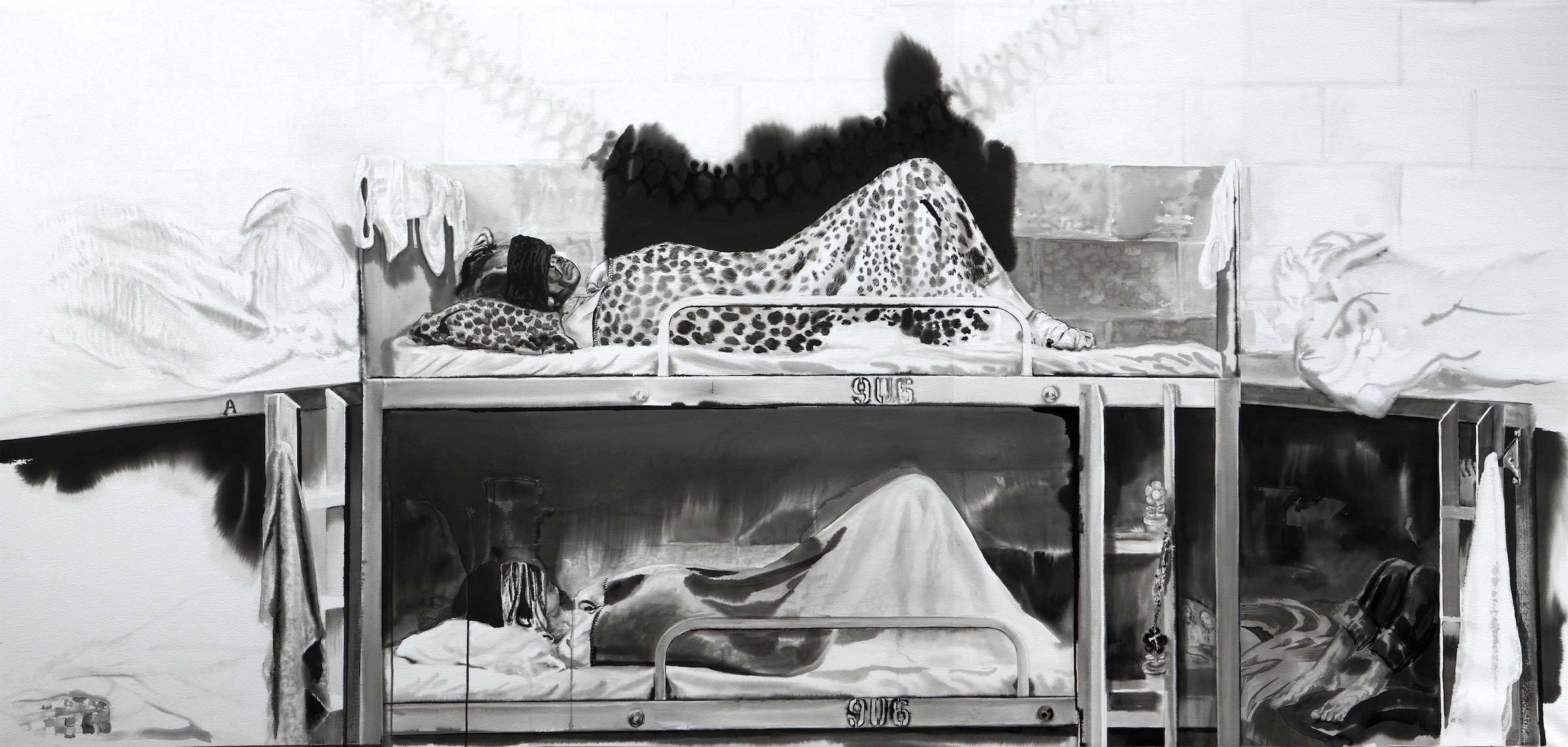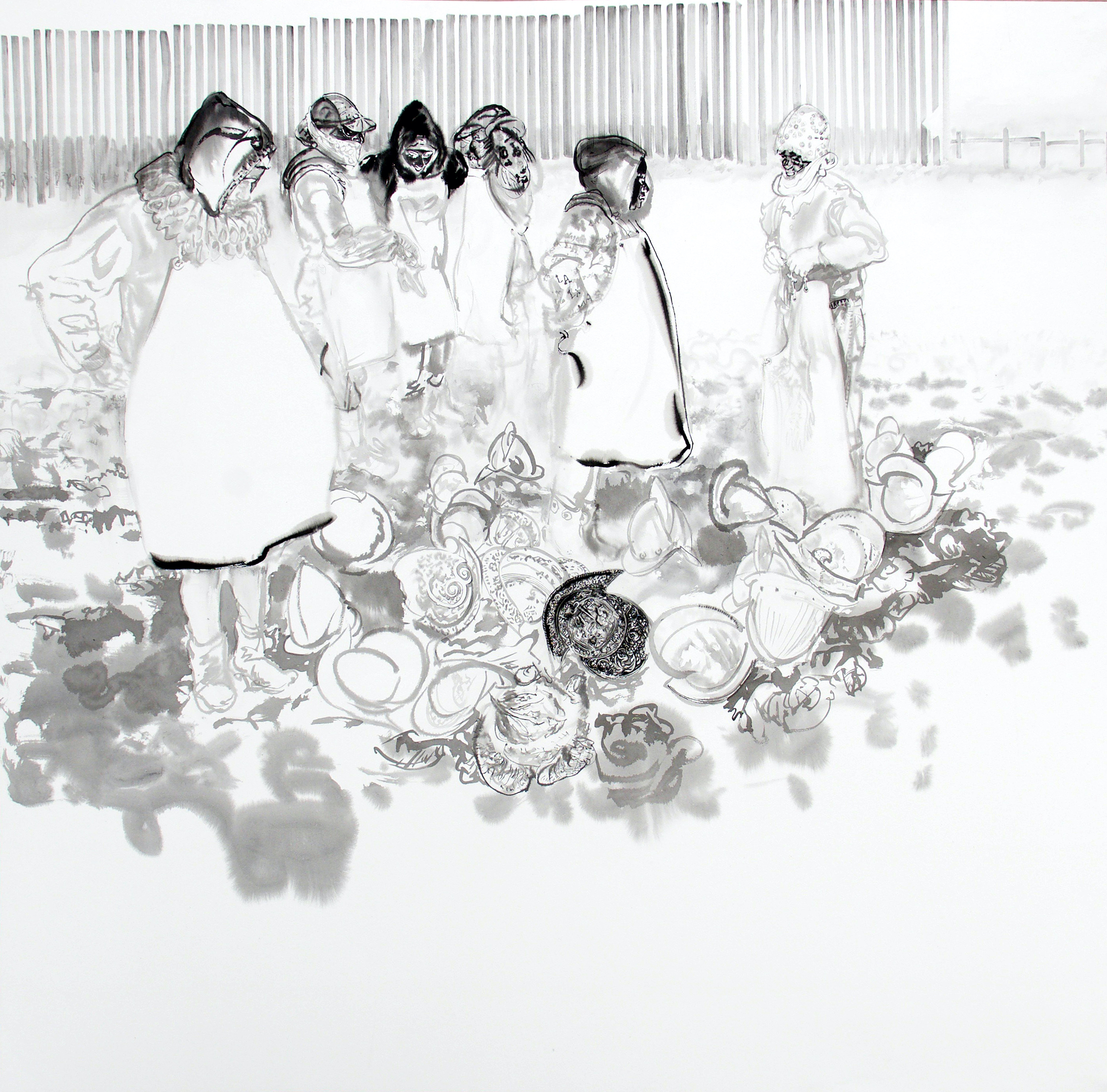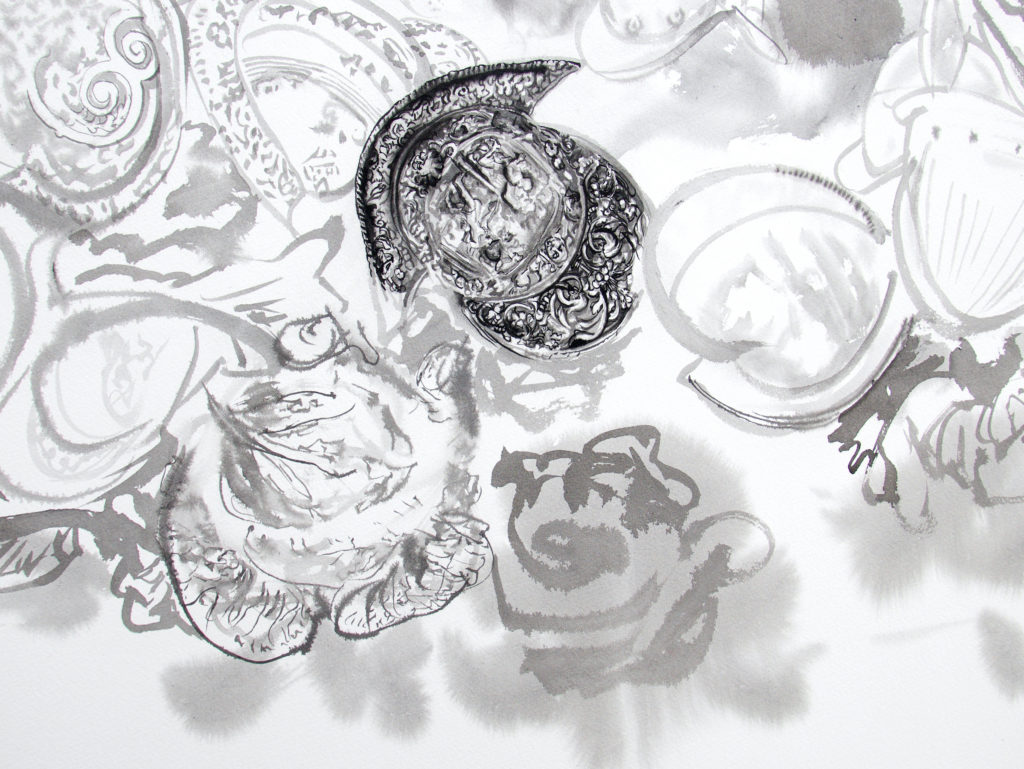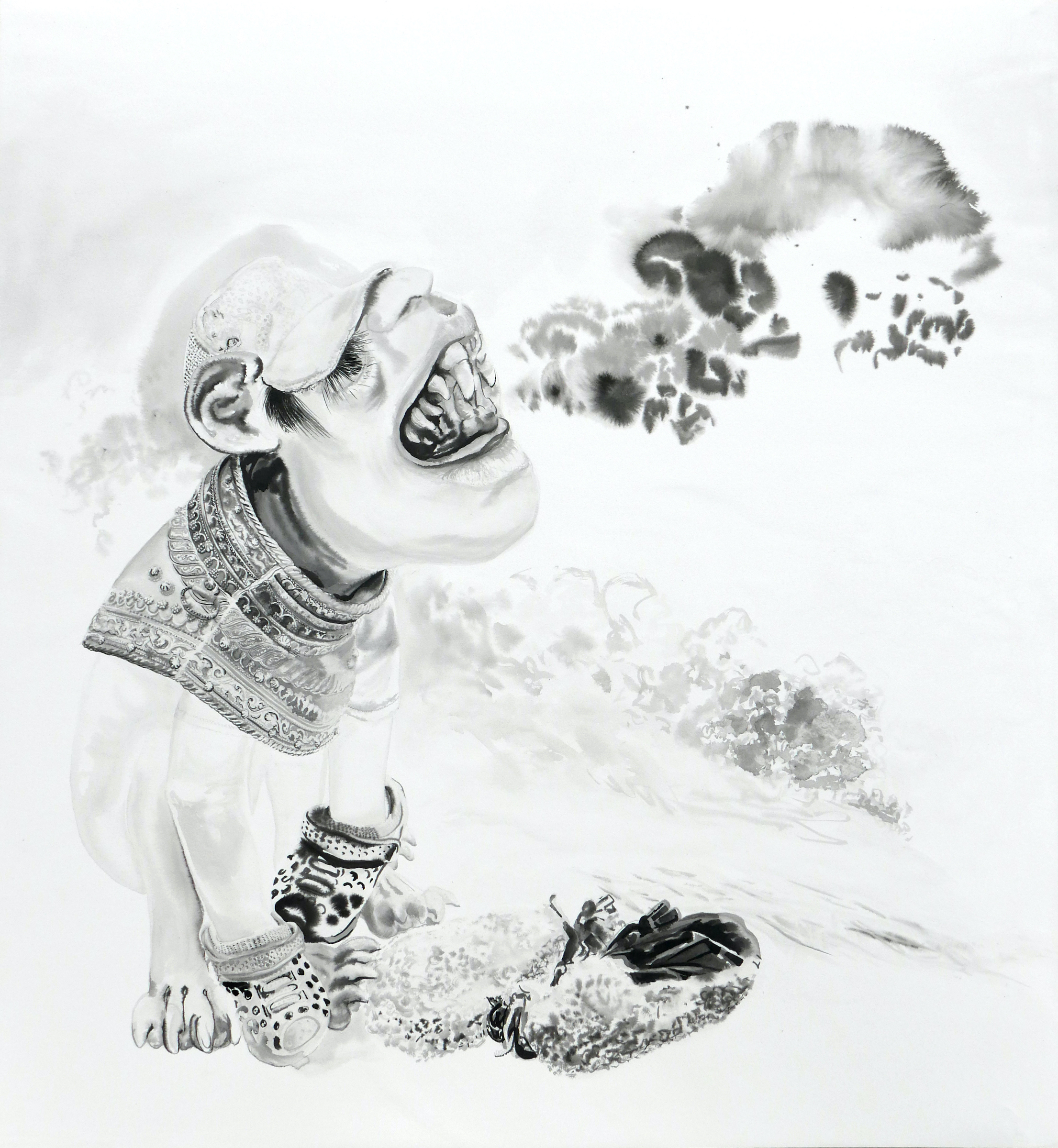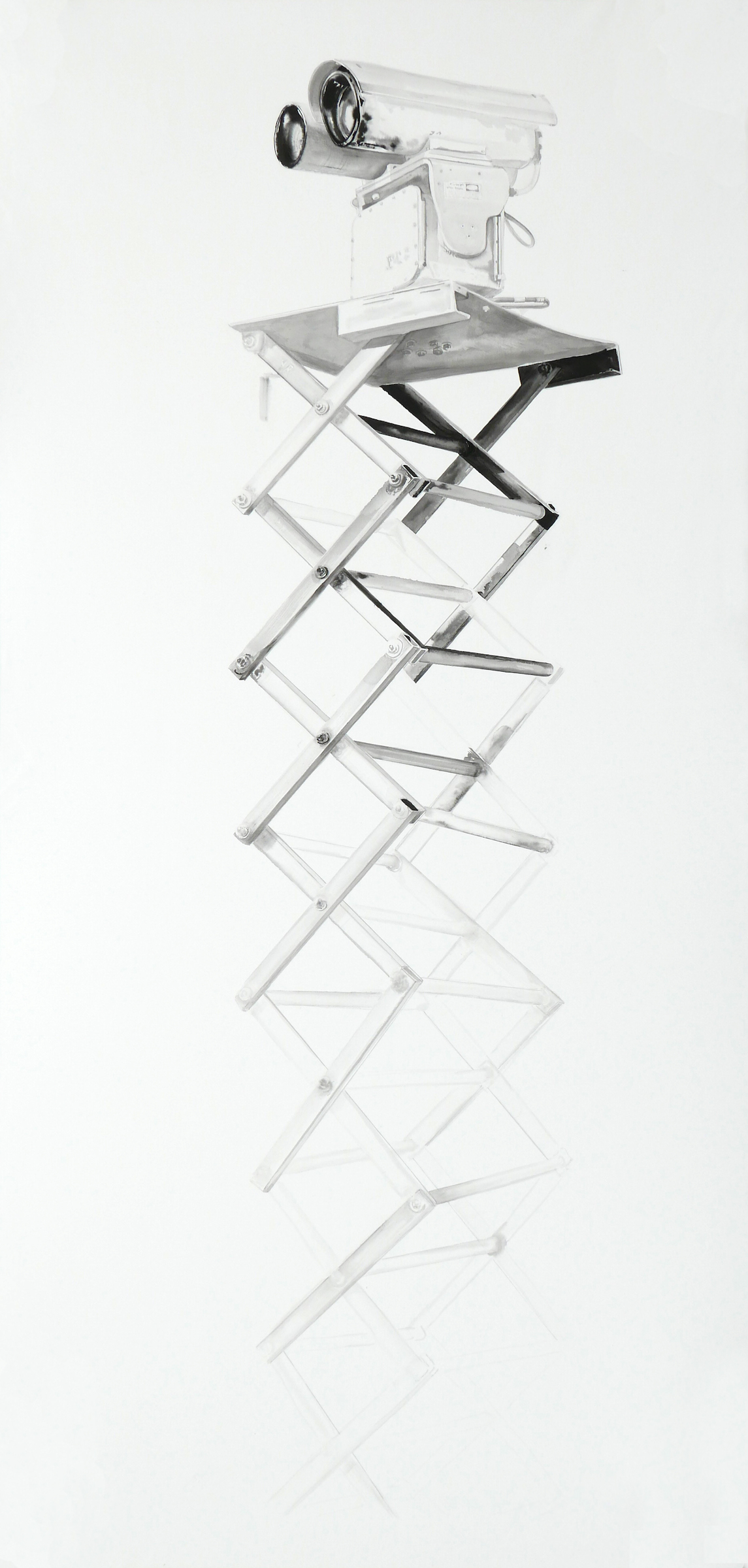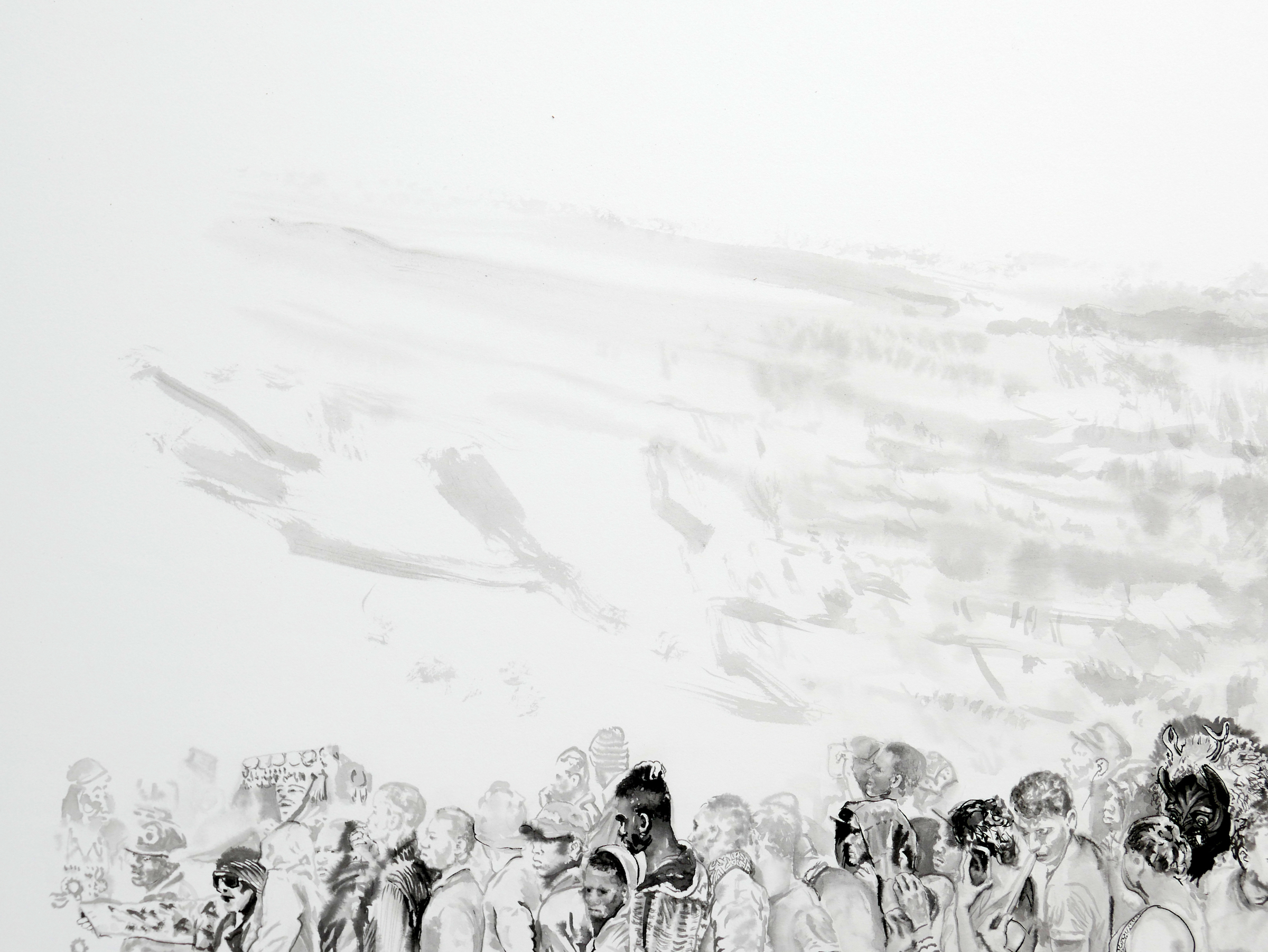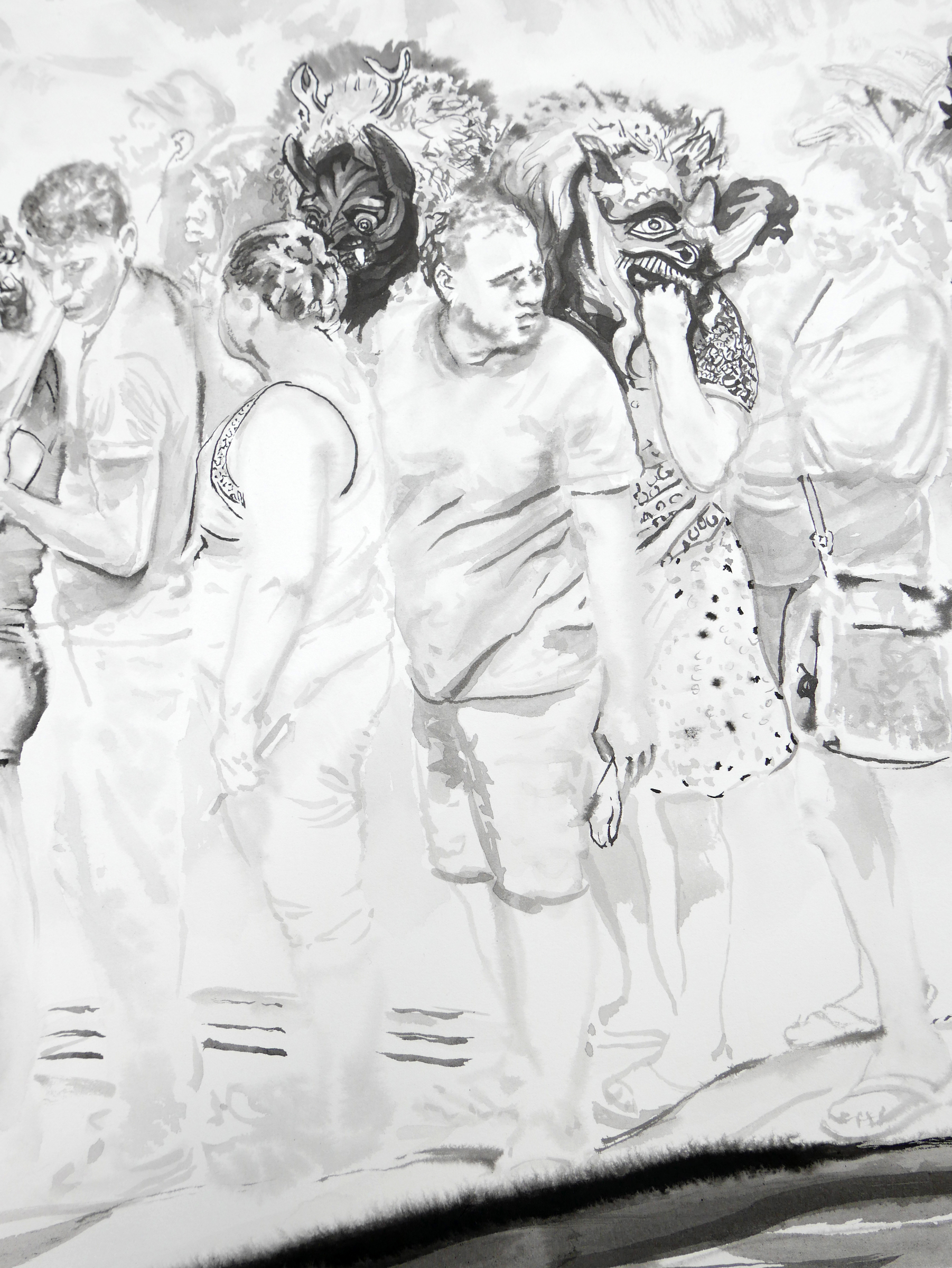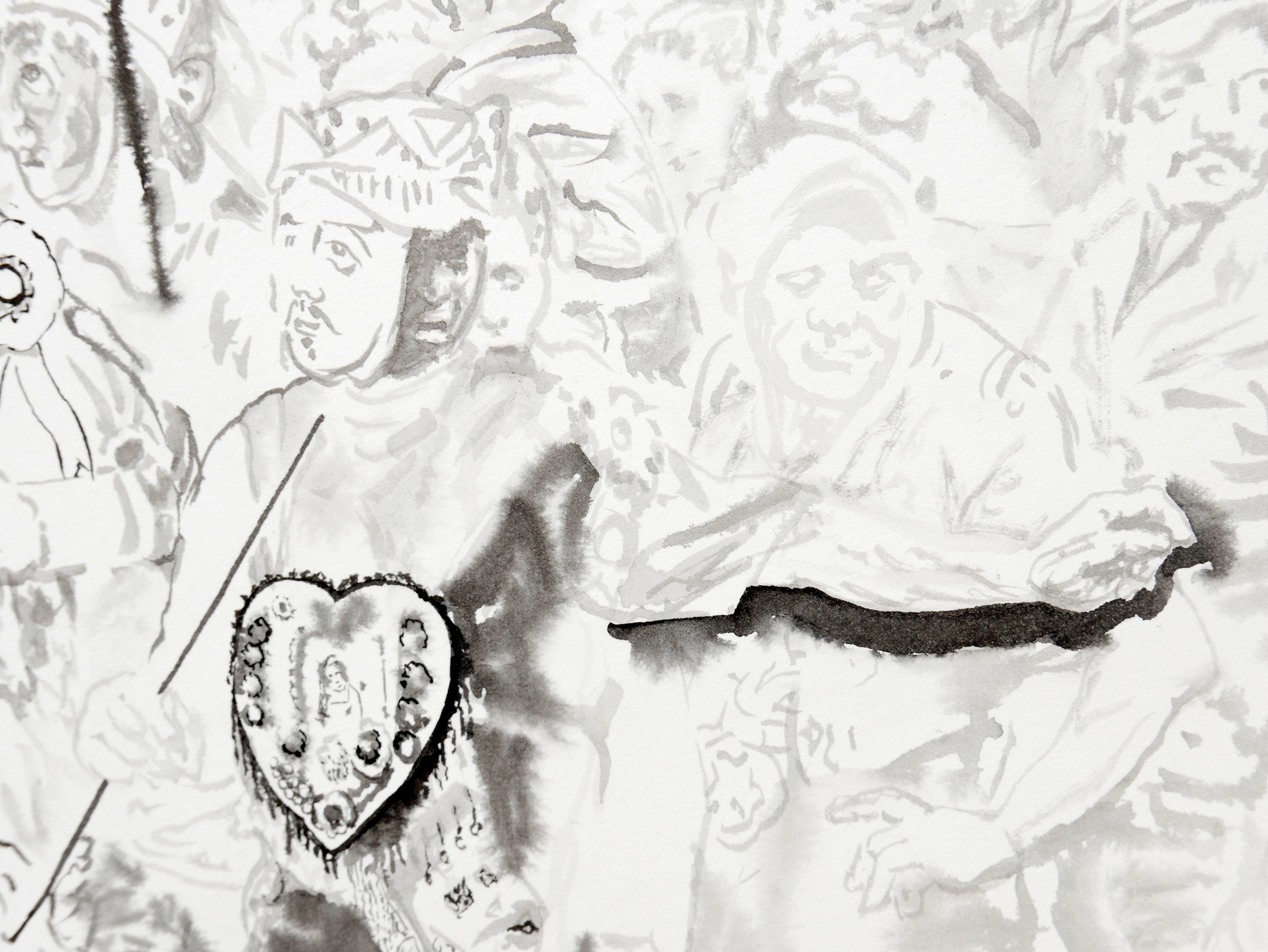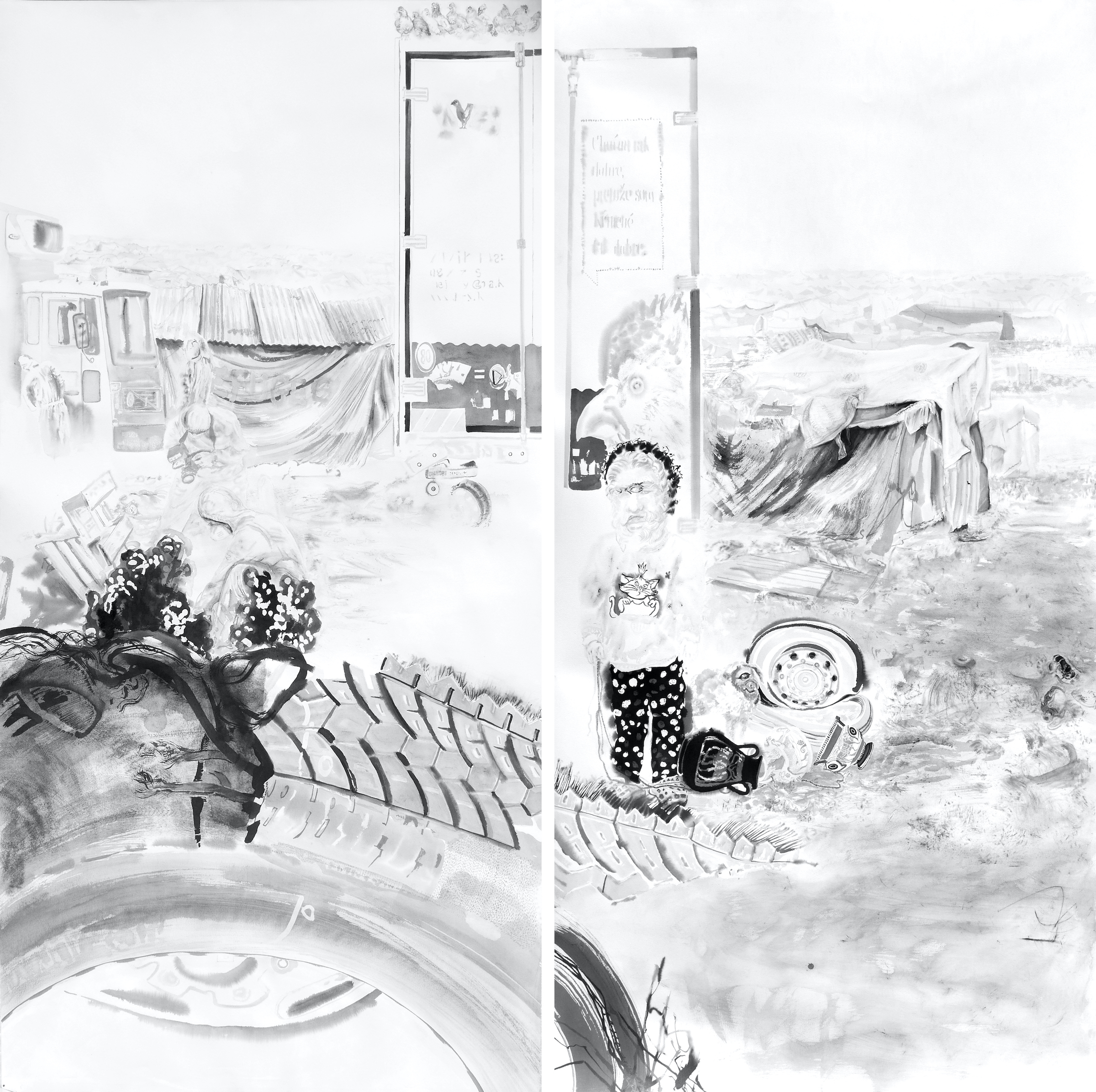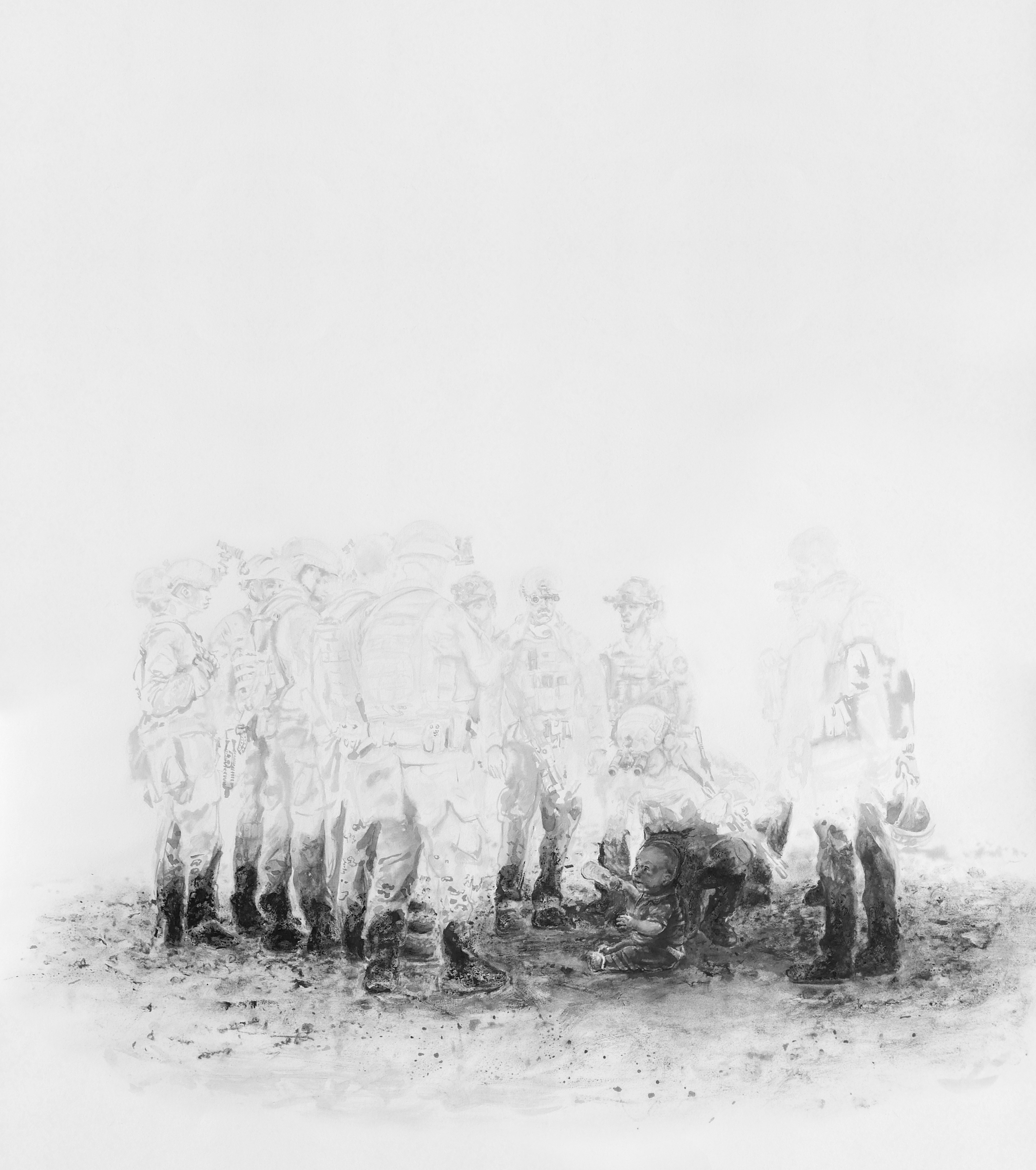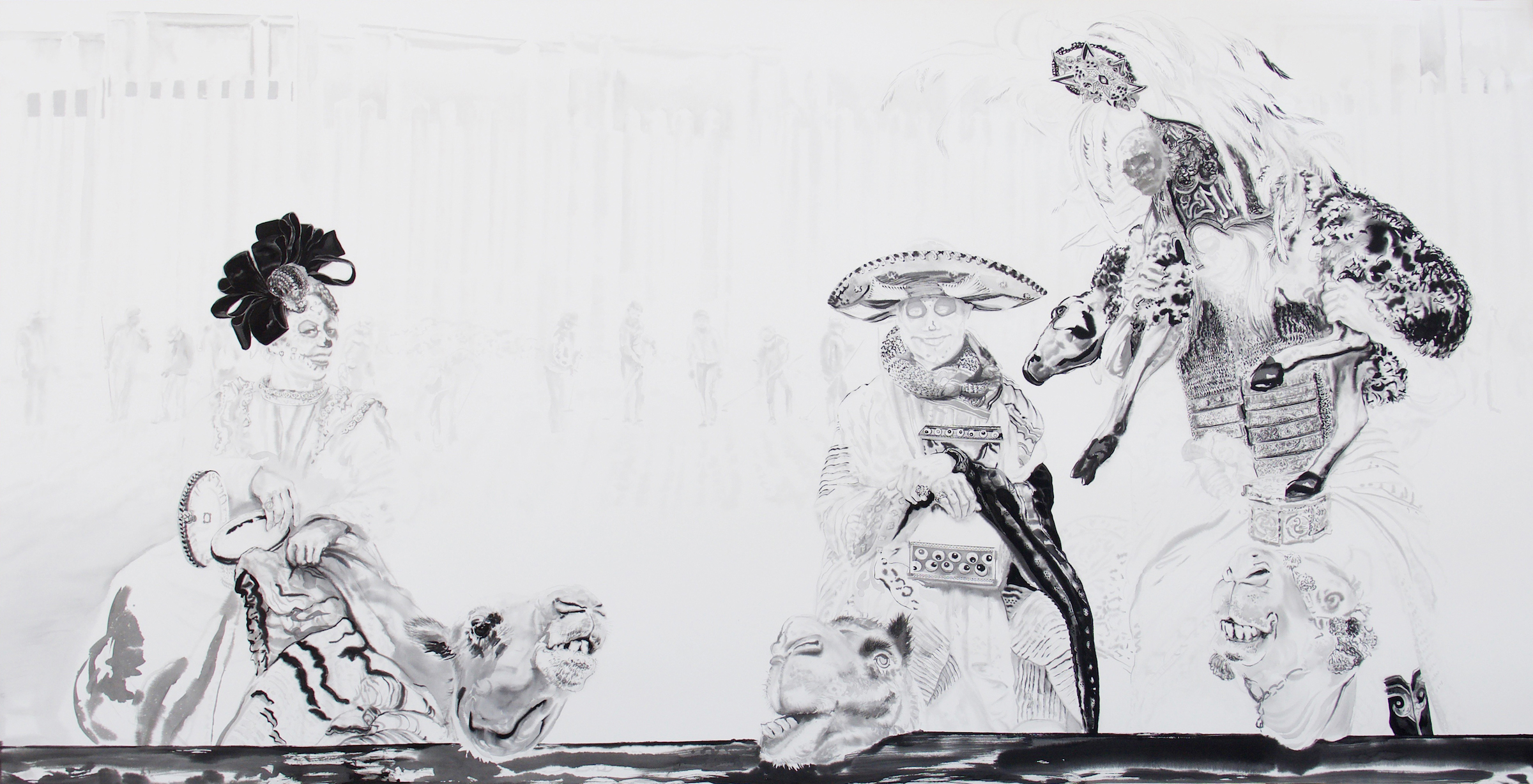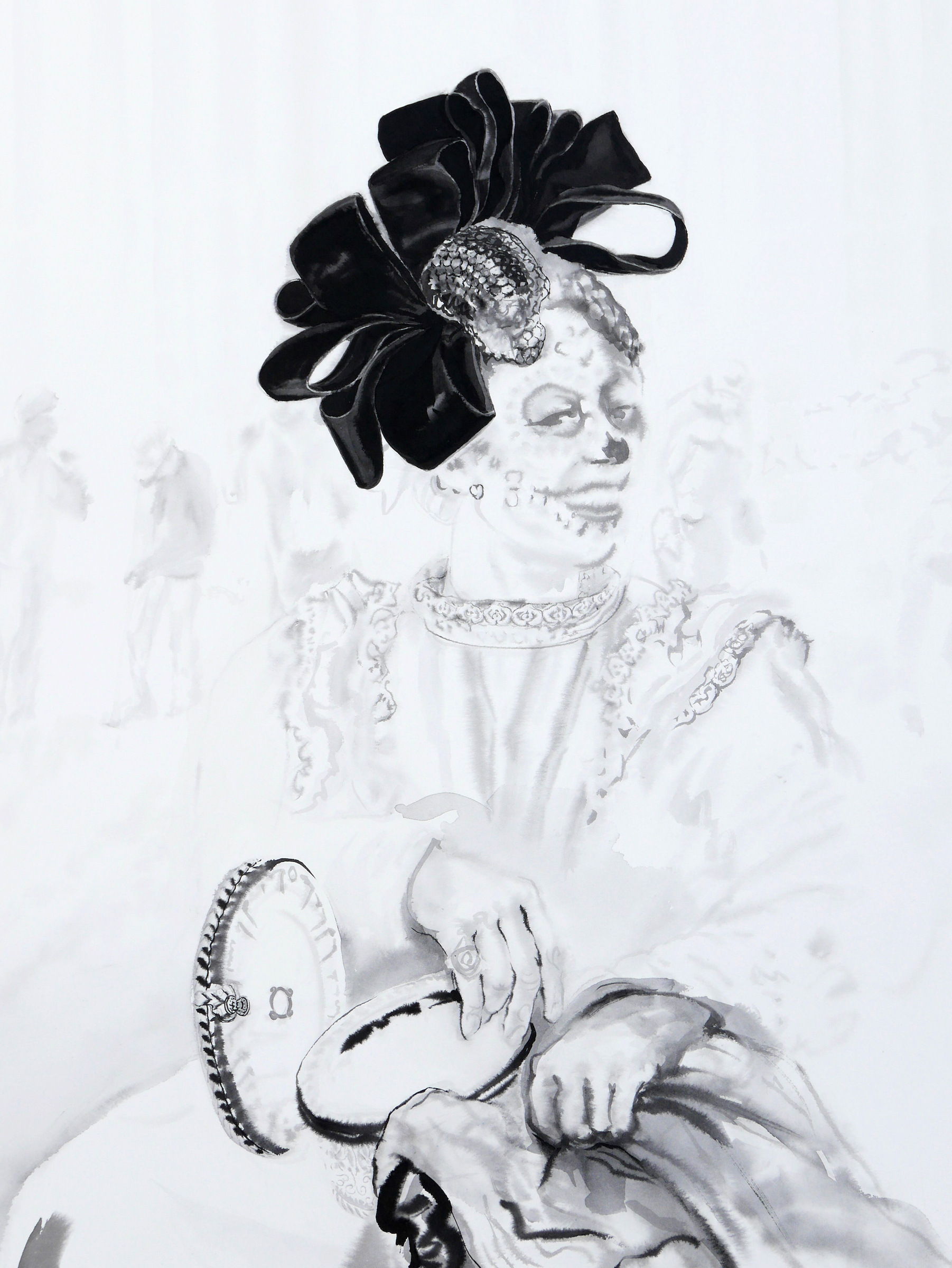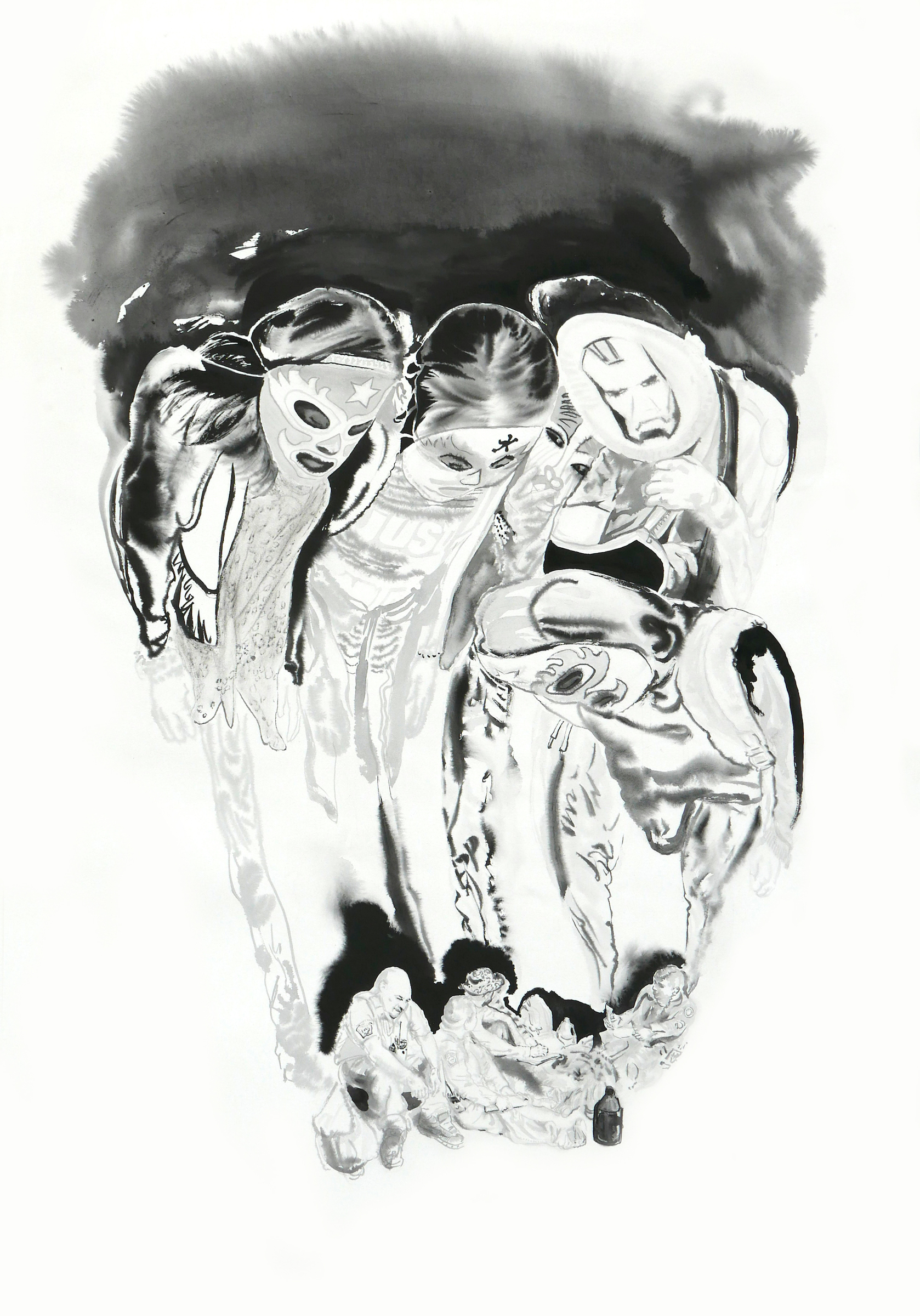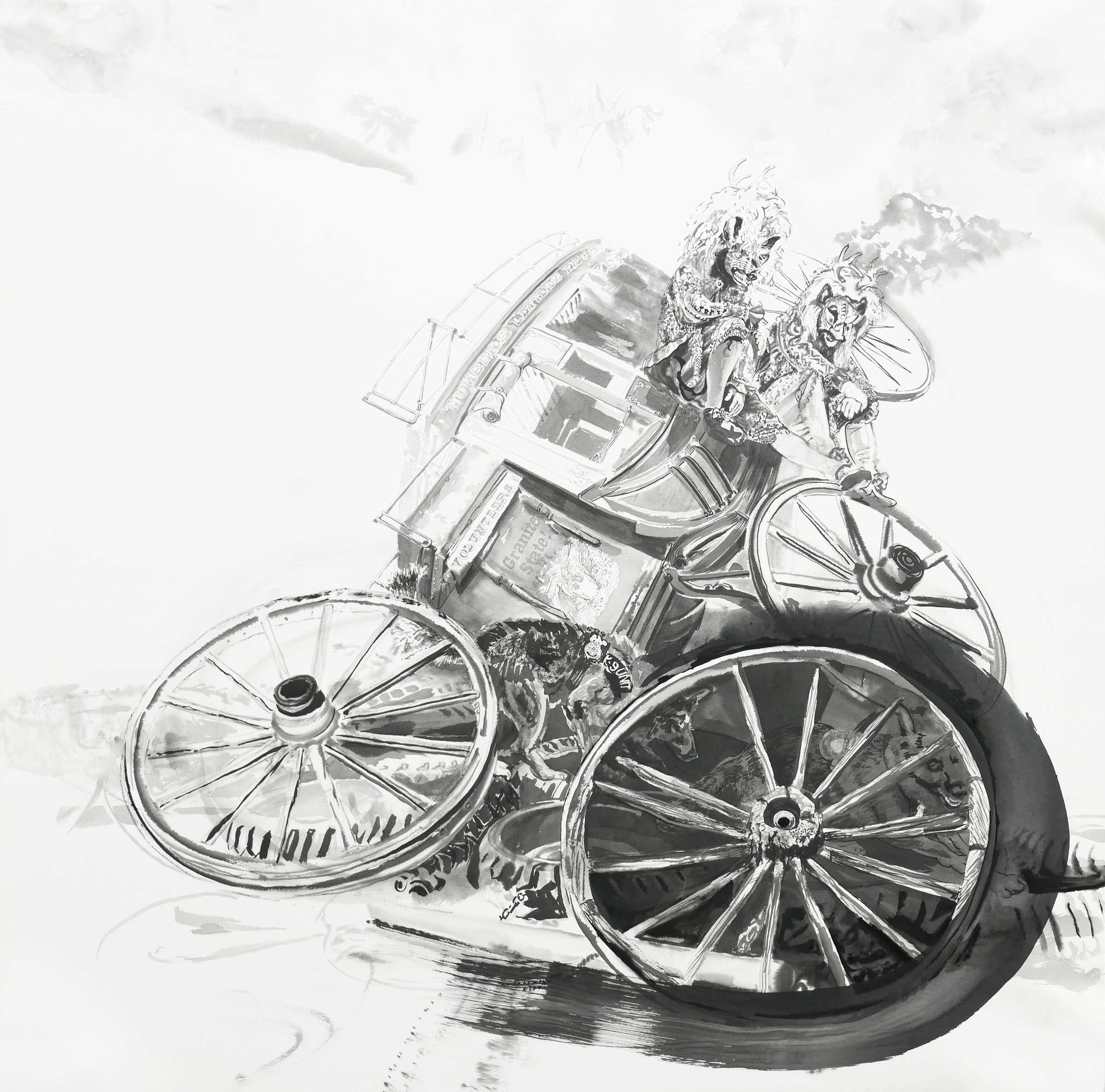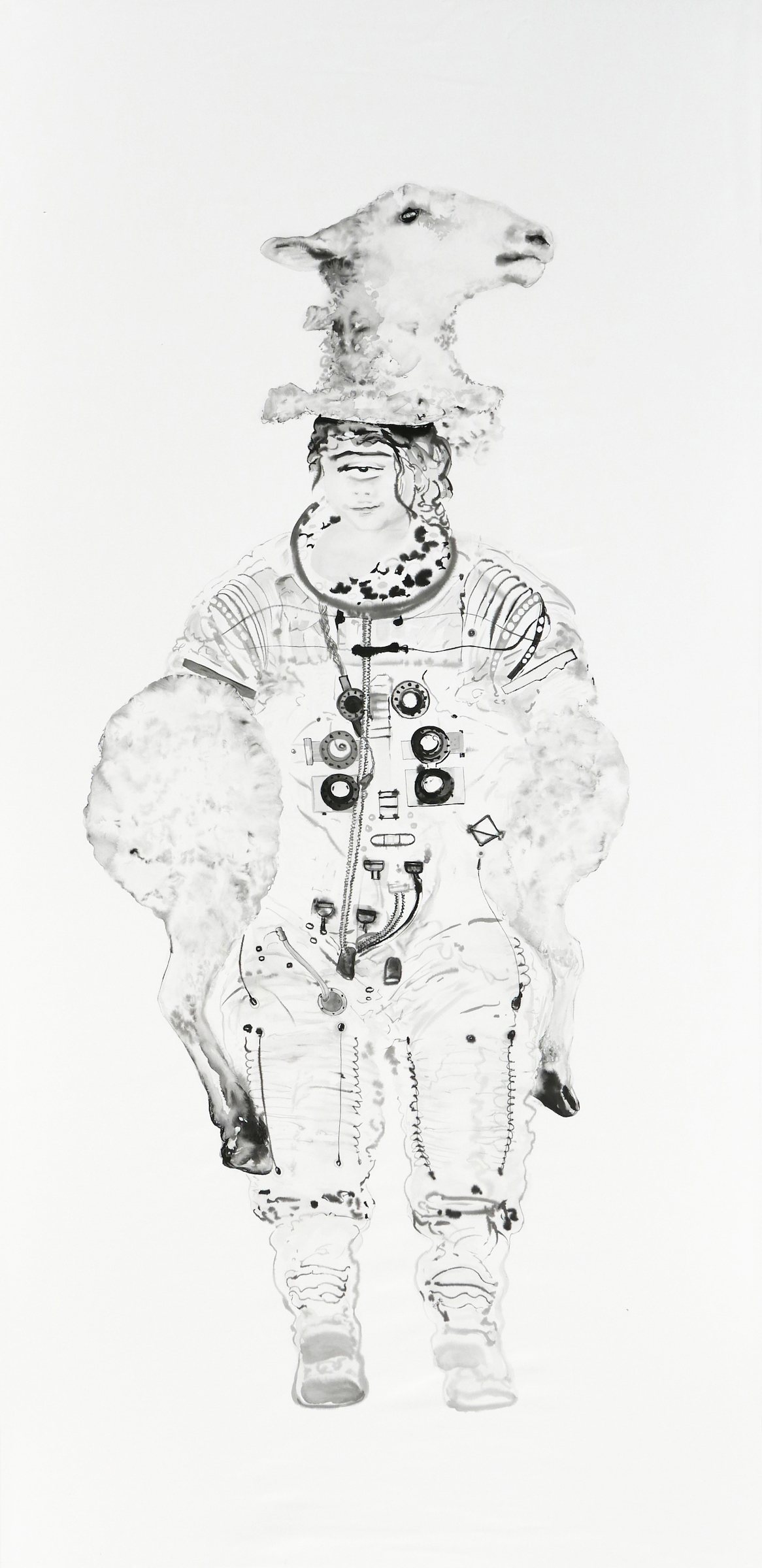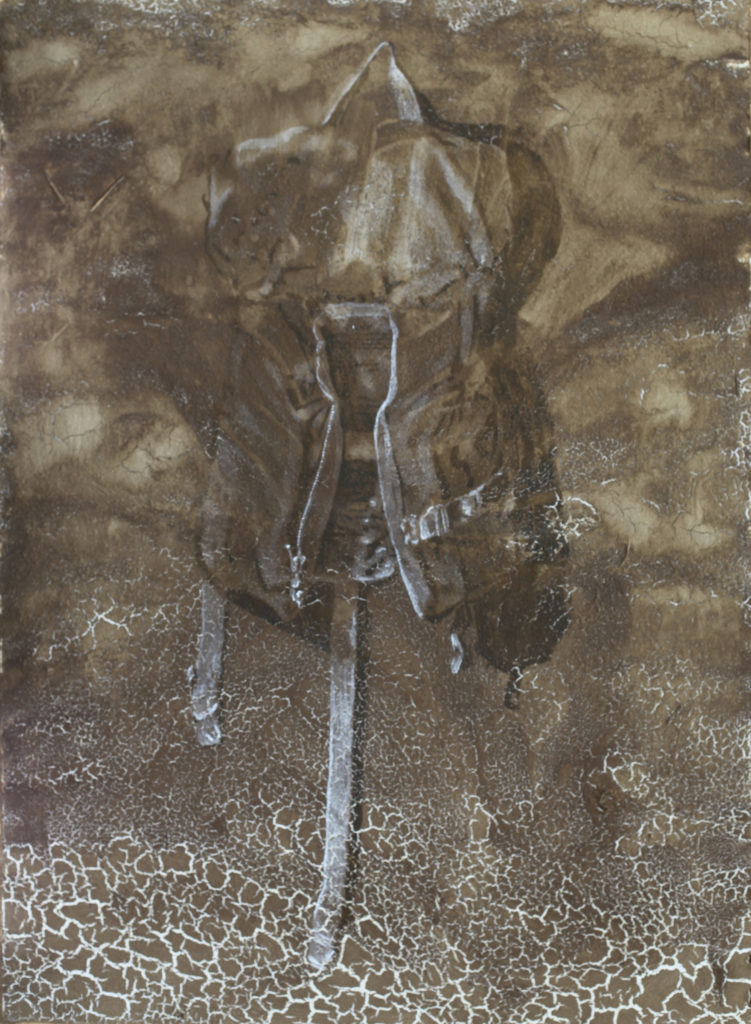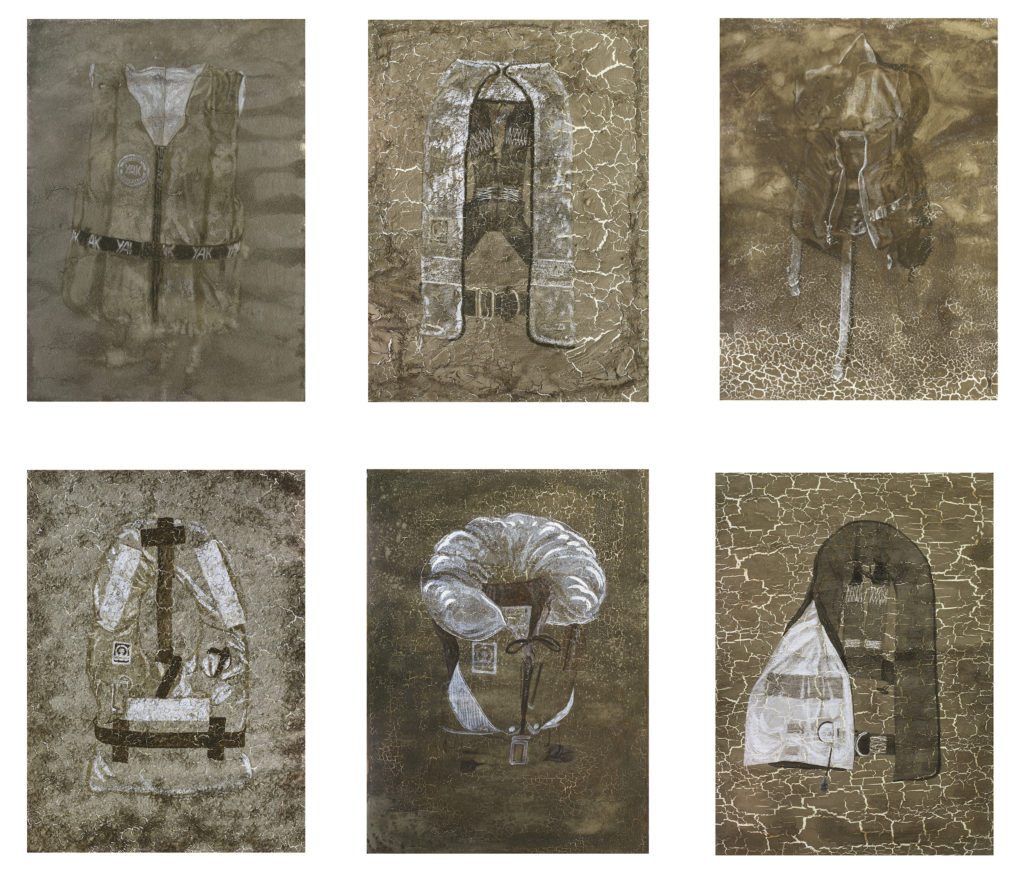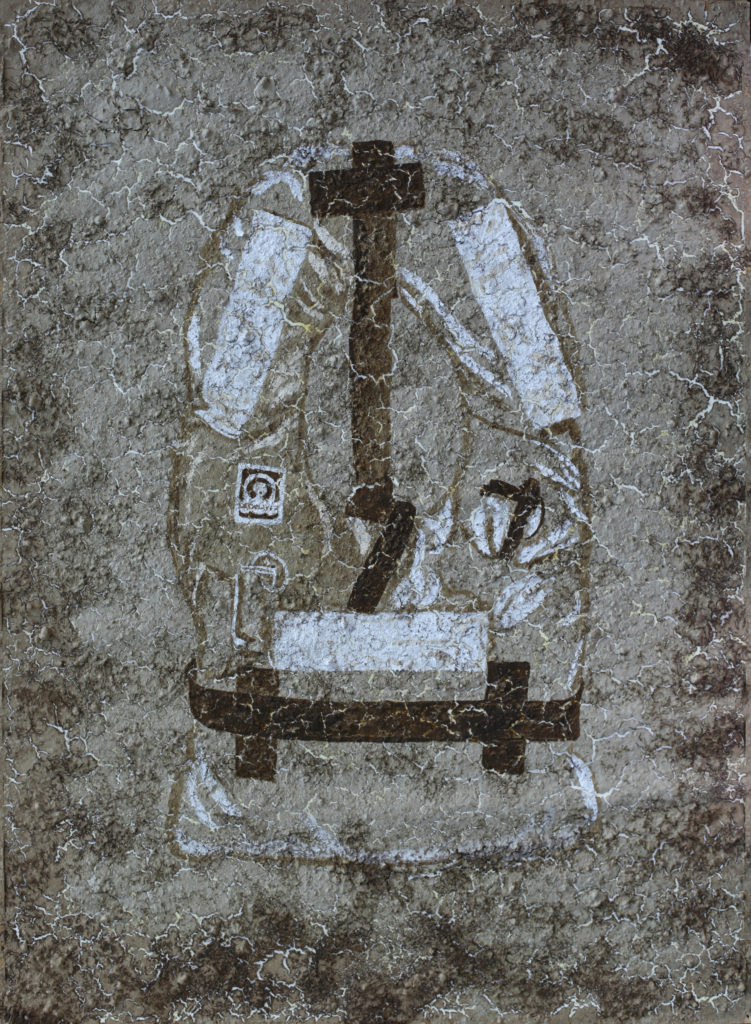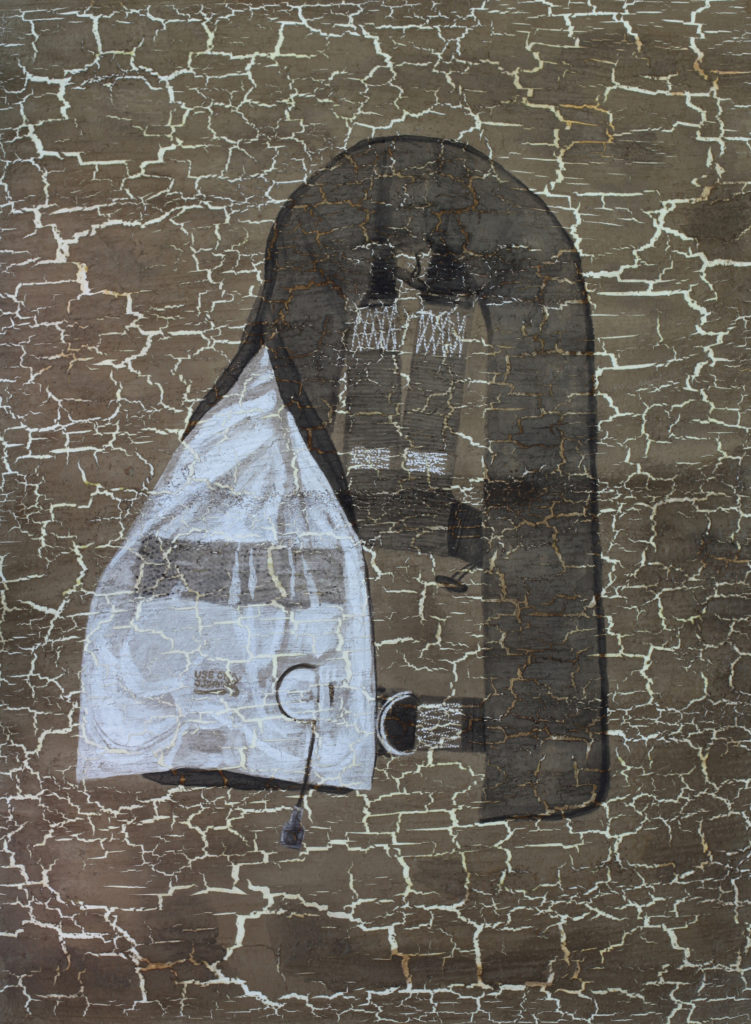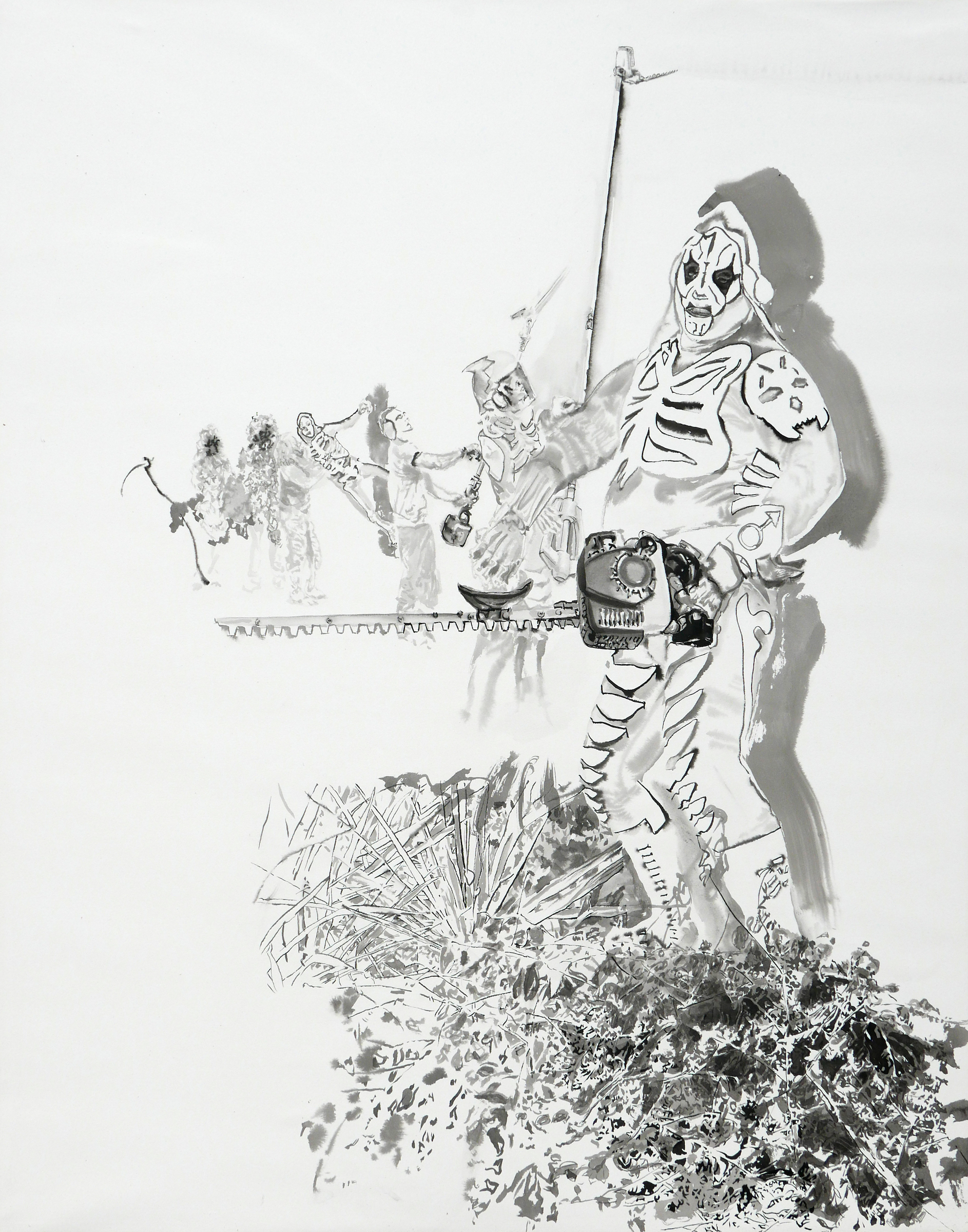
Andrew Ellis Johnson
http://www.andrewellisjohnson.com
Ascension | BOUND | Cede: Mother’s House | Companions | Conquistadors: Cabbage Harvest | Dog Boy | Dreamcatcher | Fierce Determined Undaunted | Fugue | The Adoration II | Mirage of the Magi | Patrol | Providence | Transport II | Trim and Proper | Until Human Voices Wake Us
Ascension, 2017, ink, 85 7/8 x 42 3/8 inches
Psalm By Wisława Szymborska (trs. Joanna Trzeciak) How leaky are the borders of man-made states! How many clouds float over them scot-free, how much desert sand sifts from country to country, how many mountain pebbles roll onto foreign turf in provocative leaps! Need I cite each and every bird as it flies, or alights, as now, on the lowered gate? Even if it be a sparrow—its tail is abroad, thought its beak is still home. As if that weren’t enough—it keeps fidgeting! Out of countless insects I will single out the ant, who, between the guard’s left and right boots, feels unobliged to answer questions of origin and destination. If only this whole mess could be seen at once in detail on every continent! Isn’t that a privet on the opposite bank smuggling its hundred-thousandth leaf across the river? Who else but the squid, brazenly long-armed, would violate the sacred territorial waters? How can we speak of any semblance of order when we can’t rearrange the stars to know which one shines for whom? Not to mention the reprehensible spreading of fog! Or the dusting of the steppe over its entire range as though it weren’t split in two! Or voices carried over accommodating air waves: summoning squeals and suggestive gurgles! Only what’s human can be truly alien. The rest is mixed forest, undermining moles, and wind.
BOUND 2018, Ink on paper, 41.25 x 88.5 inches
They came effortlessly, alone, empty handed, without friends, family, culture or a past. They took off on a lark without needs, or provisions; required nothing to sustain life, neither food, water nor shelter. They traveled freely amongst strangers, without care, language or desire. They tarried and waited, unseen, without apprehension of the foretold or fear of the unforeseen. They were impervious to temperature, exposure to the elements and the creatures of the land and sea. They would not be deterred—no matter the hardships, the consequences, the threats and promises of violence, oppression and humiliation. They could not be prevented—despite barriers, surveillance, military tactics and personnel, by vigilantes, the hostiles. They were able to leap tall buildings in a single bound.
Cede: Mother’s House, 2017, ink on two pieces of paper, 84 x 84 inches
Cede: Mother’s House blends the intimacy of refugee children’s drawings with more documentary information based on the destroyed homes they have left behind. Details of stuffed toys, remote controls, bedsheet patterns, souvenirs and curios are delicately drawn within rooms crudely delineated. Children’s schematics of tanks and weaponry are superimposed on subtle, more realistic renditions. One tank takes aim at the kitchen sink. The home presented is but a memory in the foreground of a tented refugee camp.
Companions, 2019, ink on paper, 42 x 90 inches
Incarcerated girls sleep in the forced sorority of isolation, separated from their parents seeking asylum at the border.
Their patterned bedding refers to the jaguar in Aztec and Mayan mythology, a being of the stars and the earth, alternately representing a brave warrior or ruler of the underworld; the night sun and darkness; power, ferocity, and valor; and the power to face one’s fears or confront one’s enemies.
Paper chains of faceless human figures cast shadows in the cinder block room. The child in the lower bunk covers her face with laundry as lights remain on throughout the night in detention centers. Misidentification and loss of identity are reflected in the mirroring of the numerical stenciling of 906 and 906 on the bunk beds. That anonymity is resisted with possessions carried for months on migrant journeys, often across deserts and swamps, including clothing, hand washed underwear drying on iron railings, religious cards, beaded necklaces and bracelets, and a plastic toy plant set on rungs of bunkbed ladders.
Conquistadors: Cabbage Harvest, 2019, Ink on paper, 54.75 x 58.5 inches
Sanguine faces
in florid fields.
Florid tales with
sanguine knives that
cut stem from base,
without damage
to the product.
Fear the landscaper.
AEJ
The cucumber workers are having a field day.
Bent to the Earth
By Blas Manuel de Luna
They had hit Ruben
with the high beams, had blinded
him so that the van
he was driving, full of Mexicans
going to pick tomatoes,
would have to stop. Ruben spun
the van into an irrigation ditch,
spun the five-year-old me awake
to immigration officers,
their batons already out,
already looking for the soft spots on the body,
to my mother being handcuffed
and dragged to a van, to my father
trying to show them our green cards.
They let us go. But Alvaro
was going back.
So was his brother Fernando.
So was their sister Sonia. Their mother
did not escape,
and so was going back. Their father
was somewhere in the field,
and was free. There were no great truths
revealed to me then. No wisdom
given to me by anyone. I was a child
who had seen what a piece of polished wood
could do to a face, who had seen his father
about to lose the one he loved, who had lost
some friends who would never return,
who, later that morning, bent
to the earth and went to work.
Dog Boy, 2019, Ink on paper, 42 x 39 inches
In Ocean Vuong’s novel On Earth We Are Briefly Gorgeous, the narrator’s immigrant parents, following a rural Vietnamese tradition of naming their children after something so worthless that the evil spirits might pass over the house and spare them, called him Little Dog.
Dreamcatcher, 2018,Ink on paper, 90 x 42.5 inches
Excerpts from Jason De Leon’s The Land of Open Graves: Living and Dying on the Migrant Trail (University of California Press, 2015) that cites the 2015 United States Border Patrol Strategic Plan. The Mission: Protect America.
The tour moves on, and we see many more gadgets that The Border Patrol relies on to ‘gain situational awareness to better detect, identify, monitor, and respond to threats to the Nation’s borders.’ It’s a dizzying list of mechanical hoodoo: ‘Biometrecis, Thermal Hand-Held Imaging Devices, Mobile Surveillance Systems[s],… Remote Video Surveillance System[s],… Vehicle and Cargo Inspection System[s],… Night Vision Devices… Integrated Fixed Towers.’ Don’t forget assault rifles, drones, four-wheelers, horses, handcuffs, stun guns, and the old-fashioned combat boot to the neck.
…
In 1989,…the annual budget for the US. Border Patrol totaled $232 million. By fiscal year 2010, that annual budget had increased to $3.8 billion[.] As astonishing as this current annual boundary enforcement budget is, it still does not include the billions of dollars allotted to other agencies such as Immigration, Customs and Enforcement that police ports of entry or those responsible for fence construction and maintenance. Based on rough estimates derived from a recent congressional report, $14.8 billion were spent on boundary security in fiscal year 2012.
Fugue, 2017, Ink and soluble graphite on two pieces of paper, 83 x 41.5 inches each
One eye saw
AEJ
monstrosities.
Another quizzical find
was a cartoon cat
printed on a sweatshirt.
Its hair sprouts tied
by an elastic band;
its paws raised in submission.
The status of statelessness that defines ‘refugee’ is not bestowed, earned or desired; its costs are dear. Rather, statelessness is a branding that burns as it takes what was given at birth. It separates, distances, and makes ‘other’. The protection sought in flight is fraught, if secured at all. Integration into a host country is mostly a prolonged trial, typically thwarted, seldom achieved, and almost never satisfactory. In the meantime, so many are suspended in limbo, involuntarily residing in camps.
Only a fraction of the world’s refugees are resettled each year. Far from visibility, nearly half are confined to camps, remaining displaced for an average of seventeen years. Glimpses of refugee experience conveyed through the media are just that; they fail to reveal the depth of loss and longing for family, home and self-sufficiency. As in ancient myths and epics, novels like Jenny Erpenbeck’s Go, Went, Gone and the Refugee Tales collection,modeled onChaucer’s Canterbury Tales, tell fuller stories of the perils of flight and return. Odysseus, himself, escaped from the Cyclops by clinging to and hiding under the belly of a sheep. Migrants today cling to tops of trains and undersides of trucks, risking their lives as they try to save their lives.
The Adoration II, 2018, Ink and wax on paper, 43.5 x 38.5 inches (45.5 x 40.5 inches framed)
The wise men
AEJ
traveled by starlight.
They didn’t offer
toothbrushes,
soap or food.
ICE Agents Storm My Porch Maria Melendez Kelson The Indiscriminate Citizenry of Earth are out to arrest my sense of being a misfit. “Open up!” they bellow, hands quiet before my door that’s only wind and juniper needles, anyway. You can’t do it, I squeak from inside. You can’t make me feel at home here in this time of siege for me and mine, mi raza. Legalized suspicion of my legitimacy is now a permanent resident in my gut. “Fruit of the prickly pear!” they swear, striding up to my table to juice me a glass of pink nectar. They’ve brought welcome baskets stuffed with proof I’m earthling. From under a gingham cover, I tug a dark feather iridescing green — cohering to “magpie” thought, to memory’s chatter, to mind. Mine. And here they have my mind translated into a slate-surfaced pond, which vibrates in the shape of a cottonwood’s autumn molt, which trees me to dirt, which soils me heat & freeze — But you’ll always be one definitive document short! I complain. Doubts can forever outstrip your geo-logic. For which they produce a lock of my natal dust, bronzed to the fluttering fiber of lacebark pine. Where’d they get that stuff? The baskets are bottomless, and it’s useless for me to insist on being distinct. Undergoing re-portation, I’m awakened to a Center, where walls between all beings are dreamt to dissolve. This poem originally appeared in Poetry magazine, March 2014.
Mirage of the Magi, 2019, ink on paper, 59 x 114.5 inches
There were signs,
AEJ
tracks, tolls, pleas.
Mirage of the Magi mocks the hysterical hype of ‘invasions,’ ‘terrorists’ and ‘bad people’ at the border. Instead, spirits riding camels bring gifts to fore. They are distinguished ‘terrorists’ from the Middle East, leading a Central American Caravan. They have journeyed to where the star stops—at the border. Barely visible in the distance, ‘hordes’ of immigrant day laborers breach the barricade to tend crops for below poverty wages without job security, benefits or the protection of labor laws. The ghostly wall behind them becomes a backdrop for those who actually cultivate our sustenance.
Transport II, 2018,ink on paper, 90 x 43 inches
People don’t turn into refugees overnight.
Excerpts from Guests of the Holy Roman Empress Maria Theresa by Lev Golinkin in The Displaced: Refugee Writers on Refugee Lives, edited by Viet Thanh Nguyen
Becoming a refugee is a gradual process, a bleaching out, a transition into a ghostly existence.
…
What matters is that a thousand little anchors once moored you to the world. Becoming a refugee means watching as those anchors are severed, one by one, until at last you’re floating outside of society, an untethered phantom in need of a new life.
Trim and Proper, 2019, ink on paper, 44 x 36 inches (46 x 38 framed)
Fear the landscaper.
AEJ
The cucumber workers are having a field day
All-American
By David Hernandez
I’m this tiny, this statuesque, and everywhere
in between, and everywhere in between
bony and overweight, my shadow cannot hold
one shape in Omaha, in Tuscaloosa, in Aberdeen.
My skin is mocha brown, two shades darker
than taupe, your question is racist, nutmeg, beige,
I’m not offended by your question at all.
Penis or vagina? Yes and yes. Gay or straight?
Both boxes. Bi, not bi, who cares, stop
fixating on my sex life, Jesus never leveled
his eye to a bedroom’s keyhole. I go to church
in Tempe, in Waco, the one with the exquisite
stained glass, the one with a white spire
like the tip of a Klansman’s hood. Churches
creep me out, I never step inside one,
never utter hymns, Sundays I hide my flesh
with camouflage and hunt. I don’t hunt
but wish every deer wore a bulletproof vest
and fired back. It’s cinnamon, my skin,
it’s more sandstone than any color I know.
I voted for Obama, McCain, Nader, I was too
apathetic to vote, too lazy to walk one block,
two blocks to the voting booth For or against
a women’s right to choose? Yes, for and against.
For waterboarding, for strapping detainees
with snorkels and diving masks. Against burning
fossil fuels, let’s punish all those smokestacks
for eating the ozone, bring the wrecking balls,
but build more smokestacks, we need jobs
here in Harrisburg, here in Kalamazoo. Against
gun control, for cotton bullets, for constructing
a better fence along the border, let’s raise
concrete toward the sky, why does it need
all that space to begin with? For creating
holes in the fence, adding ladders, they’re not
here to steal work from us, no one dreams
of crab walking for hours across a lettuce field
so someone could order the Caesar salad.
No one dreams of sliding a squeegee down
the cloud-mirrored windows of a high-rise,
but some of us do it. Some of us sell flowers.
Some of us cut hair. Some of us carefully
steer a mower around the cemetery grounds.
Some of us paint houses. Some of us monitor
the power grid. Some of us ring you up
while some of us crisscross a parking lot
to gather the shopping carts into one long,
rolling, clamorous and glittering backbone.
"All-American" from Dear, Sincerely, by David Hernandez, © 2016. University of Pittsburgh Press
Until Human Voices Wake Us, 1999, Earth, glue, insufficient rain, ink, blood, dust, spit and muck on paper, 42 x 31 inches each
‘Yes, as everyone knows, meditation and water are wedded forever… (Herman Melville)
…but what place hath reflection ‘in a dry and thirsty land, where no water is’ (Psalms 63:1)
Until Human Voices Wake Us is a drawing cycle of individual life vests drawn in blood and ink on fields of cracked earth. Deserts and other arid lands are often conducive to the visionary. Visions of promises, of unobtainable assistance or elusive rescue, are all overwhelmed by the insistence and physicality of dried mud.
mirage, salvage, dust
projections of assistance, liberation, fulfillment
buoy the disconsolate, oppressed, parched flailing in the sun
proclamations of remedy, re-stabilization, 40 acres and a mule
entice the weary and unwary alike, clutching to believe
provisions of austerity measures, the short term before
the long haul, financial undertow
reward the buried with all they can eat
AEJ

